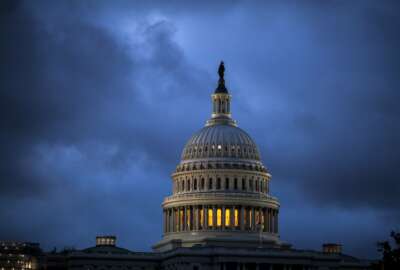
The end is near … but not just yet
The federal government’s in-house retirement system was doomed as late as last week, but then it got better.
If you’ve been in your government job for a good period of time, chances are you are not easily shocked.
Or scared. If you were, you would have gone elsewhere by now.
Threats — to your pay, pension, benefits and job security — come with the job. Many, maybe most, feds have grown accustomed to it. Some politician is always attacking overpaid, underworked bureaucrats who live in a swamp that needs draining. So you are probably not surprised that, after teetering on the brink for the umpteenth time, the federal retirement program has again survived being nuked by Congress and the White House.
Folks who planned to retire no later than close of business today can, if they like, stick around. The all-clear has been sounded. Again.
After months of talk and threats of trimming future federal retirement benefits as much as $32 billion, what usually happens happened suddenly last week.
Nothing.
Congress, with an eye to moving onto tax “reform,” last week decided to adopt the Senate budget outline.
After months of talk about cutting back or eliminating the FERS retirement program, key GOP firebrands in the House decided to adopt the Senate version of a budget resolution. Doing it this way will make it easier (as in fewer votes needed to pass) to get a tax reform plan adopted. The proposals to cut back retirement benefits, and make feds pay more toward retirement, were real enough. But old-timers urged colleagues not to panic, and certainly not to retire because of something Congress might do. And it turned out that once again, they were right. That’s the good news.
The not-so-good news is that the pension-pounding proposals will be back next year. And that is important, because the vote that saved the retirement package in the House was 216-212. That’s close. Close enough to mean that someday, some of the proposals may make it into law.
Although the proposed cuts mostly came from House Republicans, tossing the GOP rascals out won’t necessarily make life in government better or more secure. President Bill Clinton each year proposed pay raises lower than those called for by the FEPCA law. And he triggered a massive government downsizing, farming many civil service jobs out to private contractors. President Barack Obama proposed two of the three federal pay freezes. During his two terms, there were shutdowns and unpaid furloughs triggered by fights between the White House and Congress. House and Senate Democrats, with a few exceptions, are more vocal and robust defending feds when a Republican controls the White House.
All of the above puts feds between the proverbial rock and a hard place.
Given the importance of the federal presence (and payroll) in most states and many communities, feds could help themselves by letting their elected officials know they are out there, and that they care. And vote.
Can’t hurt. Might help.
Nearly Useless Factoid
Despite being the 10th month of the year, October gets its name from the Latin word “ôctō” meaning “eight.” That’s because October was the eighth month of the year in the Roman calendar.
Source: Wikipedia
Copyright © 2025 Federal News Network. All rights reserved. This website is not intended for users located within the European Economic Area.
Mike Causey is senior correspondent for Federal News Network and writes his daily Federal Report column on federal employees’ pay, benefits and retirement.
Follow @mcauseyWFED





